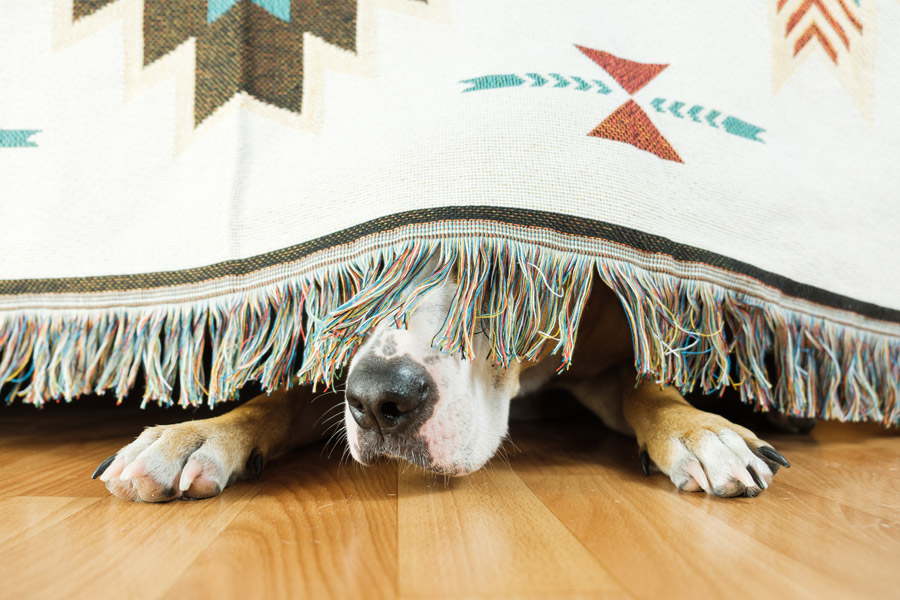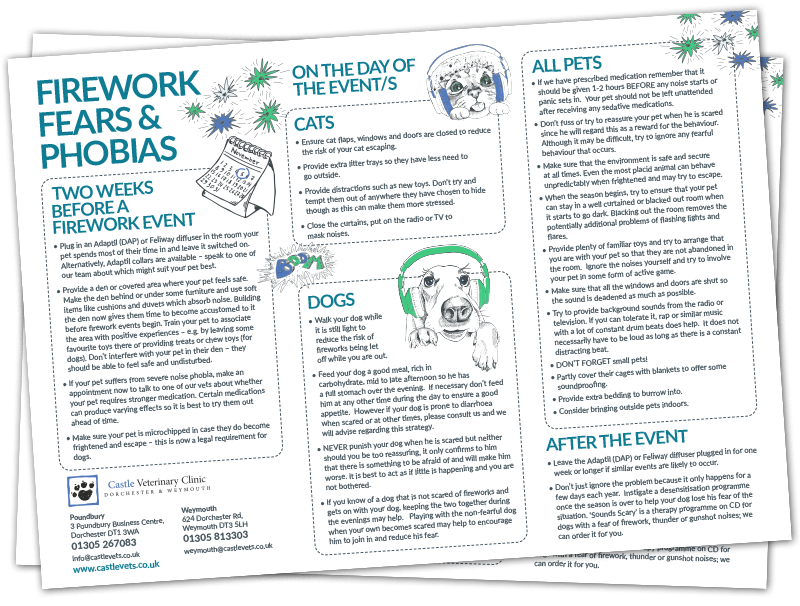Pets and Fireworks – Why Noise Annoys, and How Fears Can Turn Into Life-Limiting Phobias
Around 60% of our furry friends become agitated and afraid whilst fireworks are going off, so aside from being unpleasant for both them and your family, it’s little surprise that statistically more pets are reported missing on bonfire night than any other night during the year.
If the fear isn’t dealt with, it can quickly turn into a phobia. This is a lot more severe than anxiety and is defined as a persistent, excessive, and irrational fear response. It WILL NOT go away without help. Your dog isn’t going to grow out of it or get used to it and minor anxiety can quickly turn into a fear of thunder, then fear of sudden noise like people calling out in the street, or doors closing, and severely restrict their enjoyment of life – and yours. Scared dogs make difficult companions.
If you feel your pet would benefit from extra help, remember that Castle Club members benefit from unlimited behaviour and training advice, which includes help with anxious pets, training and anything else you may need. (Not a member yet? Click here to read the full list of year-round benefits)
No one knows why pets develop fears and phobias, but it is known that dogs who have separation anxiety often also develop a fear of noise, so if you have a nervous puppy be extra vigilant for the early signs of noise fear.

The signs are different in all animals but can often include:
- Hiding (cats like to do this more than dogs)
- Urinating and defecating around the house in otherwise house-trained animals
- Chewing
- Panting
- Pacing
- Trying to escape (digging, trying to get out through windows, running away)
- Dribbling
- Over-dependence on the owner
- Loss of appetite
- Ignoring commands
- Trembling or shaking
- Uncharacteristic barking or meowing
Although it sounds wrong, it is important to try NOT to comfort nervous pets whilst they’re showing signs of fear or anxiety as it both rewards a fearful response and reinforces their belief that there is something to be fearful of. Animals will also pick up on your anxiety which can make the problem worse, so try to remain calm and relaxed and carry on as if nothing is happening. Never punish your pet for fearful behaviour either, as they will associate the fear they feel with punishment and it will justify their fear to them.
Keep this information handy
If you have a potentially anxious pet – although it is generally a sensible list to keep handy – you should have the following information readily available to you during firework season. Storing it on your phone is a good way to do this.
You should note down:
- Your pet’s microchip number/microchip database (microchips are now a legal requirement in dogs)
- Local dog warden’s number
- Local police contact
- A clear photograph of your pet
- Access to missing pet websites
Be aware that fireworks night is not just a night! As the date falls on a weekday this year, events will take place on the weekends either side and fireworks are sold well in advance of November 5th until after News Year’s Eve. If your pet is sensitive to them you need to ACT NOW to save them several months of distress.
What can I do?!
Download our FREE guide!
You can download our handy guide on Firework Fears and Phobias where we detail what you can do to help your cats, dogs, rabbits and other small animals during the weeks before and the day of the event. It’s packed with good ideas and will help get your pet through this potentially stressful time.
If you think your pet suffers from more than just minor anxiety or would like to discuss any behavioural issues, book an appointment to come and chat to us about it. We can offer behavioural consultations, supplements and plug-ins to help calm them, and in really bad situations we can prescribe sedatives.
Don’t let your pet suffer unnecessary anxiety.
To find out more and book an appointment, call the practice on 01698 361 136
Remember…
Castle Club members benefit from unlimited behaviour and training advice, which includes help with anxious pets, training and anything else you may need. (Not a member yet? Click here to read the full list of year-round benefits)


